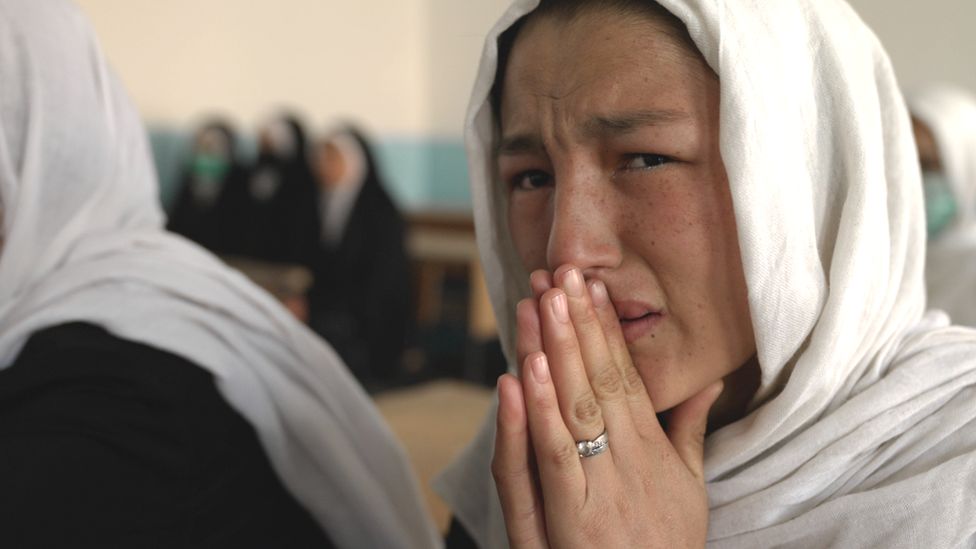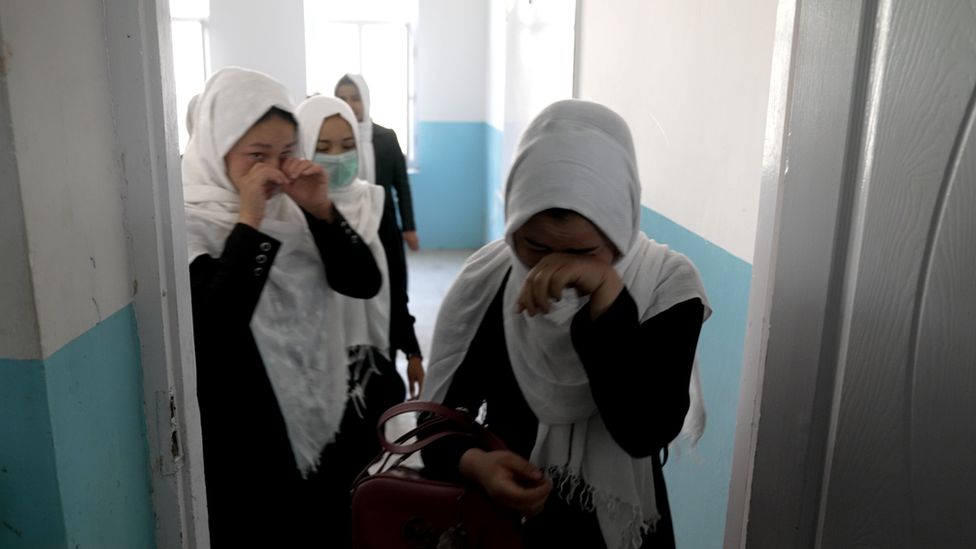Early this morning, at her home on a hilltop in the west of Kabul, 15-year-old Marzia packed her bag for school, for the first time since the Taliban took power last August.
“I became so, so happy when I heard school was restarting,” she told the BBC. “It makes me hopeful about the future again.”
Around 200 other girls had also made their way to the Sayed ul Shuhada school, far fewer than usual, as pupils and their families debated whether or not lessons would actually start and whether it would be safe for them to attend.
Since August, in most of Afghanistan, only girls’ primary schools have remained open, along with all boys’ schools.
Today as a new academic year began, girls’ secondary schools were finally expected to re-open along with other institutes.
It felt a particularly poignant moment for students here. Last year more than 90 of their classmates and school staff were killed in an attack by the local affiliate of the Islamic State group.
“The first suicide bombing happened very close to me,” says Sakina, as her eyes fill up with tears. “There were lots of dead people in front of me… I didn’t think I would survive.”

She pauses, overwhelmed with emotion, before continuing, “Our revenge on the people who did this, will be continuing our education. We want to succeed in our lives, so we can fulfil the dreams of our martyrs.”
As they entered the classrooms, the students wiped the dust off the desks but already some of the teachers were murmuring that, unexpectedly, the school would have to shut down again.
The local Taliban education official, who had given us permission to film at the school earlier this week, forwarded the headteacher a WhatsApp message, saying girls’ secondary schools would in fact remain closed until further notice.
The students reacted with shock and horror. Some began to cry. “We just want to be able to learn and serve our people,” Fatima told us. “What kind of country is this? What is our sin?”
She asked, addressing the Taliban whilst visibly distraught. “You’re always talking about Islam, does Islam say to harm women like this?”
It’s difficult to fathom the Taliban’s rationale. A Ministry of Education ceremony marking the start of the academic year went ahead despite the development.
Aziz-ur-Rahman Rayan, spokesman for the ministry, said all preparations had been made for the re-opening of schools, but that the group’s central leadership had ordered them to stay closed until, “a comprehensive plan has been prepared according to Sharia and Afghan culture”.

However, even before the Taliban took power, secondary schools in Afghanistan were already segregated by gender, whilst the uniform consisted of a modest black outfit and white hijab, or headscarf.
What’s more, in a number of provinces local Taliban officials had already begun allowing girls’ secondary schools to re-open last year, despite the lack of a central official policy.
Privately, Taliban figures admit the issue of female education is a controversial one amongst their most hardline elements.
The chaotic nature of this policy reversal, suggests the groups’ central leadership decided at the last minute to overrule their own Ministry of Education, nervous about alienating their most ultra-conservative members.

The divergence of views within the Taliban at times correlates to their geographic location.
In one part of the more cosmopolitan north of the country, even under the “shadow government” the Taliban established during their insurgency, a local leader once proudly showed off still-functioning girls schools to me during a visit.
By contrast, in a rural part of the conservative, southern province of Helmand, one Taliban fighter whose views on female education I asked, replied with a smile, “if girls want to learn, their brothers can go to school and then teach them at home”.
But even in the most conservative areas, the majority of ordinary Afghan families appear to now be in favour of female education.
Many have long questioned whether the Taliban have changed since they were in power in the 1990s when all women were forced to wear the all-encompassing burka and even girls’ primary schools remained closed?
Nowadays, the picture is more nuanced. A recent study by the World Bank found that there had actually been a rise in female primary school attendance since the Taliban takeover as security improved. Meanwhile, the group has allowed women to attend university as long as classes are segregated.
But today’s decision to keep girls’ secondary schools closed, appears to underline the gulf that still exists between the Taliban leadership and contemporary Afghan society.
